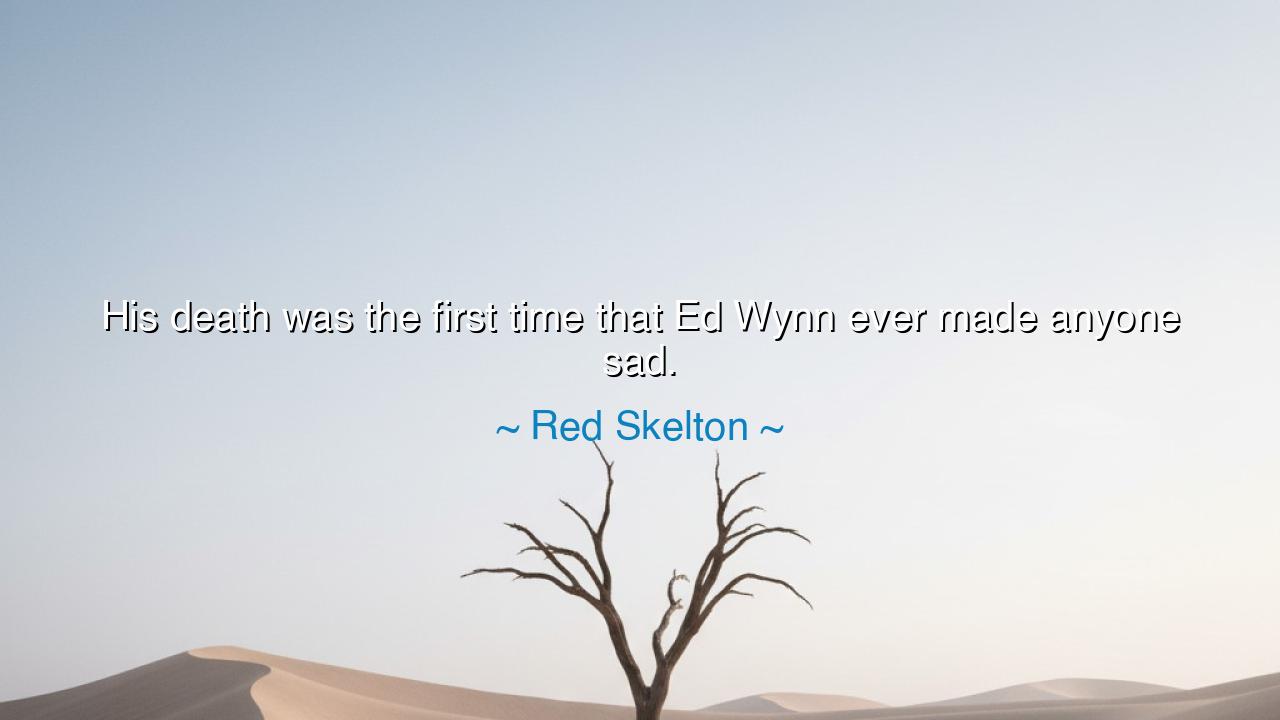
His death was the first time that Ed Wynn ever made anyone sad.






Red Skelton, himself a master of laughter and pathos, once said of his fellow comedian: “His death was the first time that Ed Wynn ever made anyone sad.” In this simple yet profound statement, he captured not only the essence of Wynn’s life but also the paradox of joy—that the one who spends his days bringing delight must, in his passing, finally evoke sorrow. It is both tribute and lament: that a man whose art was to scatter laughter left the world grieving when his voice was silenced.
The ancients knew well this paradox of joy and mourning. The Greeks told of Democritus, the philosopher who laughed at the follies of mankind, yet whose death brought silence to Abdera, leaving his people bereft of the very spirit that had lightened their days. In Rome, the satirists who mocked corruption were mourned not for their words alone but for the cheer they gave to weary citizens. So too with Ed Wynn: his life was a tapestry of mirth, his stage a lantern against the world’s darkness, and his passing a reminder that even light-bringers cast shadows when extinguished.
The brilliance of Skelton’s observation lies in its tenderness. To say that Wynn made no one sad until he died is to honor a life wholly devoted to others. Many men, even great men, leave behind legacies of conflict, resentment, or regret. But Wynn left behind only joy, and it was only his absence that drew tears. This is a rare epitaph, one that few can claim: to have been so selfless in the giving of happiness that sorrow entered only when one could give no more.
History gives us another such example in Charlie Chaplin, who, like Wynn, turned the sorrows of his own life into laughter for others. When Chaplin passed, the world mourned as if an old friend had departed, for he had made them laugh through wars, depressions, and grief. These artists remind us of the ancient role of the fool or the jester—not as mere entertainers, but as healers of the spirit, whose humor lightened the burdens of kings and commoners alike. Their deaths remind us how much we depend on joy, and how deeply we feel its absence.
But within Skelton’s words there is also a hidden challenge. It is not enough to live for oneself alone. The highest calling is to live in such a way that your presence lifts others, that your words lighten their hearts, that your life makes them smile. For then, when your day of death comes, those who remain will weep not because of bitterness or unresolved wounds, but because they have lost a wellspring of joy. Such grief is noble—it testifies that your life was a blessing.
The lesson is clear: strive to be like Wynn, to leave no bitterness behind, to fill your years with laughter given freely to others. Do not underestimate the power of joy, for it is a kind of medicine, a strength against despair, a light in the darkest hours. And remember that the legacy of a joyful heart is not measured in wealth or monuments, but in the tears of those who grieve your absence because your presence was so precious.
So let Skelton’s tribute ring in our ears: “His death was the first time he ever made anyone sad.” May it be said of us, when our time comes, that we too lived in such a way. Let us cultivate kindness, practice humor, lighten burdens, and turn sorrow into smiles while we can. For the final sadness of our passing will be borne with love—and that, truly, is the crown of a life well lived.






AAdministratorAdministrator
Welcome, honored guests. Please leave a comment, we will respond soon